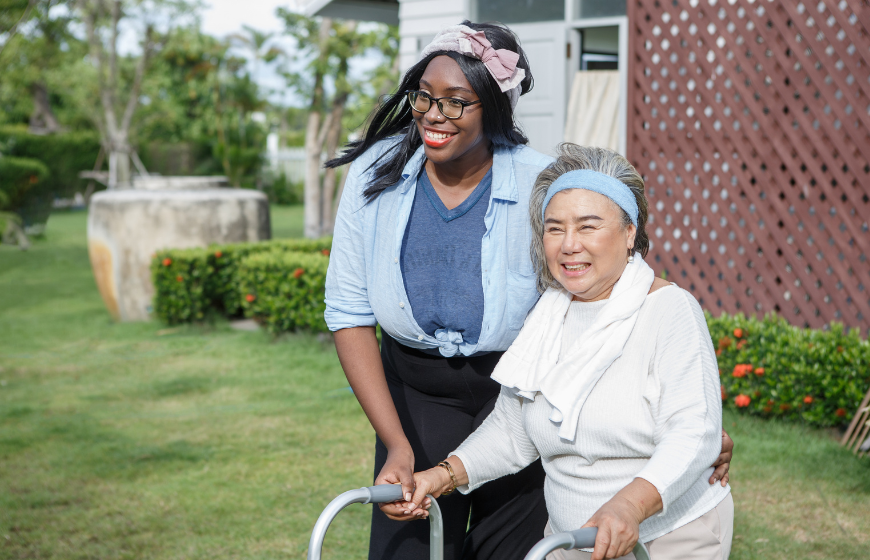As our loved ones age and develop more complex mental, physical, and medical needs, it becomes more and more difficult for families to balance their independence alongside overall quality of life. For many aging adults, transitioning into in-home care is a necessary step to preserve their well-being and safety when confronting age-related medical conditions.
However, broaching the subject of in-home care can be a delicate and challenging matter, especially for those navigating this process for the first time. The following suggestions are geared towards helping you navigate the conversation around in-home care as a solution for all members of the family.
What Are the Benefits of In-Home Care?
In-home care allows individuals to exist comfortably in familiar environments under the supervision of qualified caregivers and with some agencies, registered nurses (RNs). If your provider offers in-home care given or overseen by RNs, these professionals are able to circumvent the need for a retirement home by administering critical geriatric care services without majorly disrupting an individual’s lifestyle. Preserving this comfort and familiarity has been proven to have a positive impact on aging adults’ mental and emotional well-being. Moreover, home health care is both more personalized and comprehensive than its traditional counterpart.
Given that your loved one is probably experiencing some combination of declining physical and mental abilities, comprehensive in-home care is also designed to support activities of daily living (or ADL) essentials such as personal hygiene, grooming, homemaking, and mealtime tasks. In this regard, in-home care services help to alleviate the burden of care that often falls upon overworked family members, who may not have the necessary skills or free time to help their loved ones thrive. Shedding light on how your loved one stands to benefit from in-home care is the first step to successfully navigating this big transition.
Tips for Navigating Difficult Conversations Around In-Home Care
Because this conversation can be sensitive, here are some valuable tips for making sure that the conversation around in-home care is both effective and empathetic.
Gather Information
Before initiating a conversation about in-home care, gather information as it pertains to factors concerning your loved one’s specific needs, financial situation, medical conditions, lifestyle preferences, and daily routines. This informative phase will help you preemptively evaluate what options you will want to bring to the discussion.
Choose the Right Setting
Timing is crucial when it comes to discussing sensitive topics such as in-home care. Be sure to find a quiet, comfortable setting where you and your family can hold a relaxed and uninterrupted discussion. Avoid broaching the subject during moments when they are already unsettled or anxious about something else that is happening in their life.
Practice Active Listening, Empathy, and Compassion
Once the conversation gets started, anticipate the possibility that complicated, reactionary emotions are likely to arise. Even if things start to feel heated, always be sure to lead with empathy and compassion, acknowledging openly that this is a big change and that it stems from a deep concern for their well-being. Give them the opportunity to articulate or vent their thoughts, fears, and wishes. Be patient, avoid interrupting, and pay attention to any particular areas of concern that they may express.
Present Informative Options
After your loved one has expressed their concerns and their emotional disposition feels relatively stable, respond by presenting clear, informative options that depict several possible care solutions as well as their corresponding pros and cons. Remember that information is empowering; be sure to highlight the many benefits of in-home care, shifting the conversation from a place of shock and stress to one of openness, curiosity, and even excitement.
This stage of the conversation is uniquely important as it provides them an option to participate in the decision-making process. Giving them a sense of control and authority over their own care plan can completely shift the tone of their emotional response.
Address Any Concerns and Fears
Even with the best in-home care options at your disposal, it is natural for your loved one to have a few additional concerns and fears. These worries may include a loss of privacy, or a perceived loss of independence. Financial concern is also common for older citizens considering in-home care for the first time. Address these concerns with ample financial planning and research. Offer repeated reassurance that this process will be tailored to make them feel as comfortable as possible, and that you will always be there to support them even from a distance.
Follow Up and Be Supportive
Once you have laid out all the available options and addressed any immediate concerns, the conversation is not quite over. They may leave the initial conversation feeling vulnerable and in need of additional reassurance. You will also want to follow up and offer them support during what they perceive to be a difficult transitional period; it is doubly important to check in on them once their in-home care services begin to see how they are adjusting and to evaluate whether any adjustments or changes are needed.
Offer Loved Ones Supportive In-Home Services with Alliance Homecare
Whatever your loved ones’ reservations about in-home care may be, rest assured that Alliance Homecare’s nurses, caregivers, and medical support staff members are well equipped to foster a nurturing, professional environment that meets their needs. We offer both medical and non-medical services, such as medication administration and skilled nursing care, alongside more personal care such as consistent companionship and assistance with shopping, housekeeping, and other responsibilities. In addition to offering in-home care, Alliance Homecare’s partnerships with Sollis Health and Care2U expand our services to include complementary concierge-level medical care 24/7 every day of the year.
We are proud to be New York’s premier home health care agency, seamlessly facilitating the transition to in-home care for over 15 years. Contact our experienced care team today to start getting your loved one the care they deserve, or learn more about our available home care services here.




